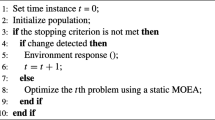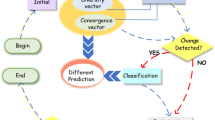Abstract
The dynamic multi-objective optimization evolutionary algorithm (DMOEA) has garnered widespread attention due to its superiority in solving dynamic multi-objective optimization problems (DMOPs). Existing DMOEAs do not judge the intensity of environmental changes after they have been detected, which may lead to incorrect evolutionary directions of the population. To address this issue, this study proposes a DMOEA based on the classification of environmental change intensity and collaborative prediction strategy. Firstly, the algorithm optimizes the static optimization process, thereby determining the relative position of individuals in the objective space and enhancing the accuracy of environmental change detection. Upon detecting an environmental change, the algorithm proposes a method based on mutual information to further classify the intensity of the environmental change, and guides the particle swarm to adopt different velocity update methods for evolution based on the classification results. Secondly, a collaborative prediction strategy is proposed to ensure that the predicted population is closer to the Pareto optimal solution Set (PS) in the new environment. Lastly, a dual individual screening strategy is employed to select superior individuals from both the predicted population and the population before the environmental change to form the initial population in the new environment. Comparative experiments with advanced DMOEAs on 20 different types of test functions demonstrate the superiority of the proposed algorithm in solving complex DMOPs.


















Similar content being viewed by others
Data availability
For special needs, please contact the corresponding author.
References
Liu C (2010) Research on dynamic multiobjective optimization evolutionary algorithms. Nat Sci J Hainan Univ 28:176–182
Zheng L, Heng-Yong C, Shi-Wen Z (2016) Orthogonal design-based dynamic multi-objective optimization algorithm. Comput Eng Appl 52(14):42–49
Ding J, Yang C, Xiao Q, Chai T, Jin Y (2018) Dynamic evolutionary multiobjective optimization for raw ore allocation in mineral processing. IEEE Trans Emerg Top Comput Intell 3(1):36–48
Wang D-J, Liu F, Jin Y (2017) A multi-objective evolutionary algorithm guided by directed search for dynamic scheduling. Comput Operat Res 79:279–290
Ghannadpour SF, Noori S, Tavakkoli-Moghaddam R, Ghoseiri K (2014) A multi-objective dynamic vehicle routing problem with fuzzy time windows: model, solution and application. Appl Soft Comput 14:504–527
Farina M, Deb K, Amato P (2003) Dynamic multiobjective optimization problems: test cases, approximation, and applications. In: International Conference on Evolutionary Multi-Criterion Optimization, Springer, pp 311–326
Deb K, Rao N UB, Karthik S (2007) Dynamic multi-objective optimization and decision-making using modified NSGA-II: a case study on hydro-thermal power scheduling. In: International Conference on Evolutionary Multi-criterion Optimization, Springer, pp 803–817
Deb K, Pratap A, Agarwal S, Meyarivan T (2002) A fast and elitist multiobjective genetic algorithm: NSGA-II. IEEE Trans Evol Comput 6(2):182–197
Wang P, Ma Y (2023) A dynamic multiobjective evolutionary algorithm based on fine prediction strategy and nondominated solutions-guided evolution. Appl Intell 53(15):18398–18419
Cai X, Wu L, Zhao T, Wu D, Zhang W, Chen J (2024) Dynamic adaptive multi-objective optimization algorithm based on type detection. Inf Sci 654:119867
Kennedy J, Eberhart R (1995) Particle swarm optimization. In: Proceedings of ICNN’95-International Conference on Neural Networks, IEEE, vol. 4, pp 1942–1948
Clerc M, Kennedy J (2002) The particle swarm-explosion, stability, and convergence in a multidimensional complex space. IEEE Trans Evol Comput 6(1):58–73
Zeng N, Zhang H, Chen Y, Chen B, Liu Y (2016) Path planning for intelligent robot based on switching local evolutionary pso algorithm. Assem Autom 36(2):120–126
Pehlivanoglu YV (2012) A new particle swarm optimization method enhanced with a periodic mutation strategy and neural networks. IEEE Trans Evol Comput 17(3):436–452
Qu B-Y, Suganthan PN, Das S (2012) A distance-based locally informed particle swarm model for multimodal optimization. IEEE Trans Evol Comput 17(3):387–402
Kennedy J, Mendes R (2002) Population structure and particle swarm performance. In: Proceedings of the 2002 Congress on Evolutionary Computation. CEC’02 (Cat. No. 02TH8600), IEEE, vol. 2, pp 1671–1676
Coello CAC, Pulido GT, Lechuga MS (2004) Handling multiple objectives with particle swarm optimization. IEEE Trans Evol Comput 8(3):256–279
Zitzler E, Laumanns M, Thiele L (2001) Spea2: improving the strength pareto evolutionary algorithm. TIK report 103
Zhou A, Jin Y, Zhang Q (2013) A population prediction strategy for evolutionary dynamic multiobjective optimization. IEEE Trans Cybernet 44(1):40–53
Sahmoud S, Topcuoglu HR (2016) Sensor-based change detection schemes for dynamic multi-objective optimization problems. In: 2016 IEEE Symposium Series on Computational Intelligence (SSCI), IEEE, pp 1–8
Richter H (2009) Detecting change in dynamic fitness landscapes. In: 2009 IEEE Congress on Evolutionary Computation, IEEE, pp 1613–1620
Ma X, Yang J, Sun H, Hu Z, Wei L (2021) Multiregional co-evolutionary algorithm for dynamic multiobjective optimization. Inf Sci 545:1–24
Sahmoud S, Topcuoglu HR (2016) Sensor-based change detection schemes for dynamic multi-objective optimization problems. In: 2016 IEEE Symposium Series on Computational Intelligence (SSCI), IEEE, pp 1–8
Shang R, Jiao L, Ren Y, Li L, Wang L (2014) Quantum immune clonal coevolutionary algorithm for dynamic multiobjective optimization. Soft Comput 18:743–756
Sahmoud S, Topcuoglu HR (2016) A memory-based nsga-ii algorithm for dynamic multi-objective optimization problems. In: Applications of Evolutionary Computation: 19th European Conference, EvoApplications 2016, Porto, Portugal, March 30–April 1, 2016, Proceedings, Part II 19, Springer, pp 296–310
Yang Y, Ma Y, Wang M, Wang P (2023) A dynamic multi-objective evolutionary algorithm based on gene sequencing and gene editing. Inf Sci 644:119256
Zhang K, Shen C, Liu X, Yen GG (2020) Multiobjective evolution strategy for dynamic multiobjective optimization. IEEE Trans Evol Comput 24(5):974–988
Zheng J, Zhang Z, Zou J, Yang S, Ou J, Hu Y (2022) A dynamic multi-objective particle swarm optimization algorithm based on adversarial decomposition and neighborhood evolution. Swarm Evol Comput 69:100987
Liu R, Li J, Mu C, Jiao L (2017) A coevolutionary technique based on multi-swarm particle swarm optimization for dynamic multi-objective optimization. Eur J Oper Res 261(3):1028–1051
Yang Z, Jin Y, Hao K (2018) A bio-inspired self-learning coevolutionary dynamic multiobjective optimization algorithm for internet of things services. IEEE Trans Evol Comput 23(4):675–688
Wang P, Ma Y, Wang M (2022) A dynamic multi-objective optimization evolutionary algorithm based on particle swarm prediction strategy and prediction adjustment strategy. Swarm Evol Comput 75:101164
Yang J, Zou J, Yang S, Hu Y, Zheng J, Liu Y (2023) A particle swarm algorithm based on the dual search strategy for dynamic multi-objective optimization. Swarm Evol Comput 83:101385
Hatzakis I, Wallace D (2006) Dynamic multi-objective optimization with evolutionary algorithms: a forward-looking approach. In: Proceedings of the 8th Annual Conference on Genetic and Evolutionary Computation, pp 1201–1208
Jiang M, Huang Z, Qiu L, Huang W, Yen GG (2017) Transfer learning-based dynamic multiobjective optimization algorithms. IEEE Trans Evol Comput 22(4):501–514
Zou J, Li Q, Yang S, Zheng J, Peng Z, Pei T (2019) A dynamic multiobjective evolutionary algorithm based on a dynamic evolutionary environment model. Swarm Evol Comput 44:247–259
Yang Y, Ma Y, Zhao Y, Zhang W, Wang Y (2024) A dynamic multi-objective evolutionary algorithm based on genetic engineering and improved particle swarm prediction strategy. Inf Sci 660:120125
Zhang Q, Li H (2007) Moea/d: a multiobjective evolutionary algorithm based on decomposition. IEEE Trans Evol Comput 11(6):712–731
Parsopoulos KE, Vrahatis MN (2002) Recent approaches to global optimization problems through particle swarm optimization. Nat Comput 1:235–306
Wu Y, Jin Y, Liu X (2015) A directed search strategy for evolutionary dynamic multiobjective optimization. Soft Comput 19:3221–3235
Yong-Jie M, Min C, Ying G, Shi-Sheng C, Zeng-Yan W (2020) Research progress of dynamic multi-objective optimization evolutionary algorithm. Acta Automatica Sinica 46(11):2302–2318
Jiang S, Yang S, Yao X, Tan KC, Kaiser M, Krasnogor N (2018) Benchmark functions for the cec’2018 competition on dynamic multiobjective optimization. Technical report, Newcastle University
Goh C-K, Tan KC (2008) A competitive-cooperative coevolutionary paradigm for dynamic multiobjective optimization. IEEE Trans Evol Comput 13(1):103–127
Zhou A, Jin Y, Zhang Q (2013) A population prediction strategy for evolutionary dynamic multiobjective optimization. IEEE Trans Cybernet 44(1):40–53
Van Veldhuizen DA, Lamont GB (2000) On measuring multiobjective evolutionary algorithm performance. In: Proceedings of the 2000 Congress on Evolutionary Computation. CEC00 (Cat. No. 00TH8512), IEEE, vol. 1, pp. 204–211
Liu M, Liu Y (2016) A dynamic evolutionary multi-objective optimization algorithm based on decomposition and adaptive diversity introduction. In: 2016 12th International Conference on Natural Computation, Fuzzy Systems and Knowledge Discovery (ICNC-FSKD), IEEE, pp 235–240
Jiang M, Huang Z, Qiu L, Huang W, Yen GG (2017) Transfer learning-based dynamic multiobjective optimization algorithms. IEEE Trans Evol Comput 22(4):501–514
Yang C, Wang D, Tang J, Qiao J, Yu W (2024) Multi-reservoir ESN-based prediction strategy for dynamic multi-objective optimization. Inf Sci 652:119495
Jiang M, Wang Z, Hong H, Yen GG (2020) Knee point-based imbalanced transfer learning for dynamic multiobjective optimization. IEEE Trans Evol Comput 25(1):117–129
Cao L, Xu L, Goodman ED, Bao C, Zhu S (2019) Evolutionary dynamic multiobjective optimization assisted by a support vector regression predictor. IEEE Trans Evol Comput 24(2):305–319
Zhou A, Jin Y, Zhang Q (2013) A population prediction strategy for evolutionary dynamic multiobjective optimization. IEEE Trans Cybernet 44(1):40–53
Parmee C (2000) Evolutionary design and manufacture a multi-population approach to dynamic optimization problems, pp 299–307, https://doi.org/10.1007/978-1-4471-0519-0
Shimoyama K, Oyama A, Fujii K (2005) A new efficient and useful robust optimization approach-design for multi-objective six sigma. In: 2005 IEEE Congress on Evolutionary Computation, IEEE, vol. 1, pp 950–957
Acknowledgements
This work is supported by the NSFC (National Natural Science Foundation of China) project (Grant Number: 62066041, 62466054).
Author information
Authors and Affiliations
Contributions
Yu Wang contributed to conceptualization, data curation, methodology, software, writing-original draft. Yongjie Ma contributed to funding acquisition, methodology, project administration, supervision. Quanxiu Li contributed to formal analysis. Yan Zhao contributed to formal analysis.
Corresponding author
Ethics declarations
Conflict of interest
The authors declare that they have no known competing financial interests or personal relationships that could have appeared to influence the work reported in this paper.
Additional information
Publisher's Note
Springer Nature remains neutral with regard to jurisdictional claims in published maps and institutional affiliations.
Rights and permissions
Springer Nature or its licensor (e.g. a society or other partner) holds exclusive rights to this article under a publishing agreement with the author(s) or other rightsholder(s); author self-archiving of the accepted manuscript version of this article is solely governed by the terms of such publishing agreement and applicable law.
About this article
Cite this article
Wang, Y., Ma, Y., Li, Q. et al. A dynamic multi-objective optimization evolutionary algorithm based on classification of environmental change intensity and collaborative prediction strategy. J Supercomput 81, 54 (2025). https://doi.org/10.1007/s11227-024-06480-4
Accepted:
Published:
DOI: https://doi.org/10.1007/s11227-024-06480-4




